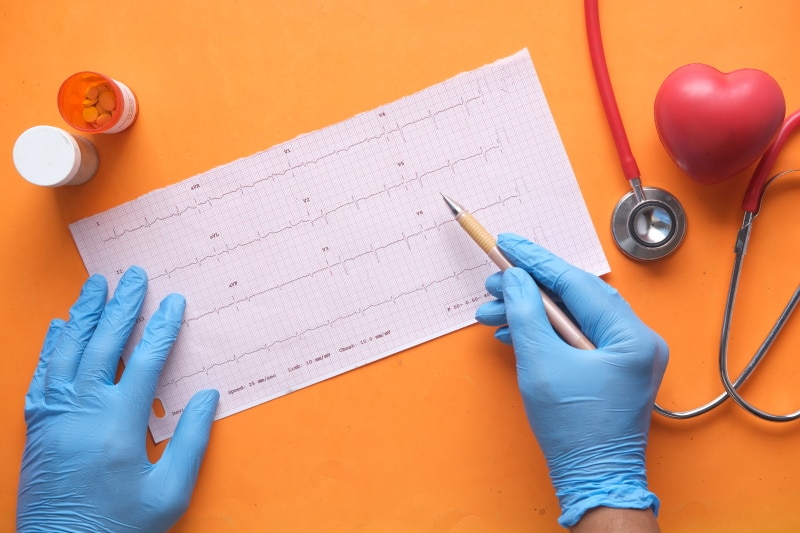It goes without saying that heart health is important. World Heart Day (29 September) highlights the importance of being aware of how to take better care of your heart and knowing when it’s time to see a doctor.
So, in celebration of World Heart Day, we decided to provide you with some useful guidelines for taking better care of your ticker.
10 Signs You Should Visit A Cardiologist
1. Chest pain or discomfort
It may sound obvious – but it’s often ignored. And as the most common sign of heart danger, it warrants a spot at the top of the list. If you’ve got a blocked artery or you’re having a heart attack – you may feel pain, tightness, or pressure in your chest.
Everyone experiences it differently – some people describe it as an elephant sitting on them, and some people feel a pinching or burning sensation. Either way, the feeling usually lasts longer than a few minutes and could happen when you’re at rest or doing something physical.
If it’s just a brief pain, or if it’s a localized pain that hurts more when you touch or push on it – then it’s probably not your heart. But you should still get it checked out by a doctor. If the symptoms are severe and don’t go away after a few minutes you should immediately contact emergency medical services.
It’s also important to remember that you can have heart problems and even have a heart attack without experiencing chest pain. This is particularly common among women.
2. Nausea, indigestion, heartburn, or stomach pain
If you experience chronic nausea, indigestion, heartburn, or stomach pain it could be a sign of heart problems. Some people have these symptoms during a heart attack, and they may even vomit.
Women are more likely to report these types of symptoms than men. Of course, you might experience an upset stomach for many reasons that have nothing to do with your heart. It could just be something you ate, but you need to be aware that it can also happen during a heart attack.
So if you’re experiencing these symptoms and you’re at risk of heart problems, let a doctor find out what’s going on, especially if you also have any of the other symptoms on this list.
3. Extreme exhaustion or weakness
If you suddenly feel fatigued or winded after doing something you usually have no problem doing – like climbing stairs or carrying groceries from the car – you should make an appointment with your doctor right away.
Often these types of significant changes are more telling for healthcare providers than every little ache and pain you might experience. Extreme exhaustion or unexplained weakness – sometimes for days at a time, is often a symptom of heart disease – especially in women.
4. A cough that won’t go away
In many cases, this isn’t a sign of heart trouble. But if you have heart disease or you know you’re at risk, it’s important to keep an eye on this.
If you have a long-lasting cough that produces white or pink mucus, it could be a sign of heart failure. This happens when the heart can’t keep up with the body’s demands, causing blood to leak back into the lungs.
5. Pain that spreads to the arm
Another classic sign of heart health concerns is pain that radiates down the left side of the body. It almost always starts in the chest and moves outward, but even patients who’ve mainly experienced the pain in their arms have had heart attacks.

6. Dizziness or light-headedness
While there are other reasons why you may lose your balance or feel faint for a moment – like if you haven’t had enough to eat or drink – this could also be a sign that your blood pressure has dropped, and your heart isn’t able to pump the way it should.
So, if you suddenly feel unsteady and also have chest discomfort or shortness of breath, call a doctor right away.
7. Throat or jaw pain
By itself, throat or jaw pain probably isn’t heart-related. But when you’re experiencing pain or pressure in the center of your chest, that then spreads up into your throat or jaw, it could be a sign of heart problems or the onset of a heart attack. If the feeling doesn’t go away contact emergency medical services immediately.
8. Snoring
While it’s normal to snore while you snooze – if you’re experiencing unusually loud snoring that sounds like gasping or choking, it could be a sign of sleep apnea. This is when you stop breathing for brief moments several times at night while you’re still sleeping. Naturally, this puts extra stress on your heart.
Your doctor can arrange a sleep study to see if you’ve got this condition. If you do, you many need a CPAP machine to smooth out your breathing while you sleep.
9. Swollen legs, feet, and ankles
Swelling in your legs, feet, and ankles could be a sign that your heart doesn’t pump blood as effectively as it should. When the heart can’t pump fast enough, blood backs up in the veins and causes bloating. Heart failure can also make it harder for the kidneys to remove extra water and sodium from the body – which can lead to bloating.
10. Irregular heartbeat
It’s normal for your heart to race when you are nervous or excited, or to skip or add a beat once in a while. But if you feel like your heart is beating out of time for more than just a few seconds, or if it happens often, tell your doctor.
In many cases, it’s usually caused by too much caffeine or not enough sleep. Occasionally, it could signal a condition called atrial fibrillation – which needs treatment. Ask your doctor to check it out.

Heart Health Risk Factors
If you have any of the following key risk factors, you should be seeing a cardiologist for regular check-ups:
- Family history of heart disease: Your heart disease risk increases if you have a family history of it. Cardiologists can monitor risk factors, conduct screenings, and recommend early interventions when needed.
- You’re a smoker (or used to be): A history of smoking increases the risk of arterial blockages and damages the arteries, a cause of heart disease.
- You have diabetes: High blood glucose levels can lead to coronary artery disease.
- You have high cholesterol: Elevated cholesterol levels can cause atherosclerosis, a form of heart disease in which narrowed arteries slow or block blood flow to the heart. The result can be a heart attack.
- You have high blood pressure: Blood pressure is the force at which blood pushes against the arterial walls and can reduce the amount of blood and oxygen that reaches the heart when levels are high, resulting in a heart attack.
When Should You See A Cardiologist
Cardiologists often see people when they’re experiencing chest discomfort or chest pain. But everyone experiences this differently – some symptoms feel like indigestion so people often might write them off. But it’s a very serious symptom that patients should not ignore.
You should see a cardiologist if you’re experiencing these symptoms:
- Feeling like your heart is racing very fast – often called heart palpitations
- Feeling like you might faint
- Shortness of breath that’s worsening
- Chest discomfort or bad indigestion (heartburn) that’s not going away
- Swelling in the legs, feet, and ankles
- Noticeable, unexplained weight gain
These could be common signs of heart failure and heart disease, which is why it’s important to see a cardiologist. Find a cardiologist near you using the Air Doctor app.
Heart Health FAQs
If the pain gets rapidly worse, head to the emergency room immediately because it could be an indication of a serious problem with your heart. Every person has a different tipping point – but if your symptoms are persistent, you should seek medical attention.
Common issues include:
- Heart failure
- Care after a heart attack
- High blood pressure
- High cholesterol
- Coronary artery disease
- Valvular heart disease
- Heart rhythm disorders
Many times, your primary care doctor or GP will refer you to a cardiologist. You can also browse the Air Doctor app to find a GP or cardiologist near you.












